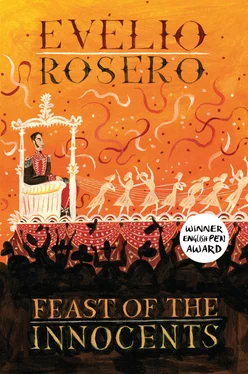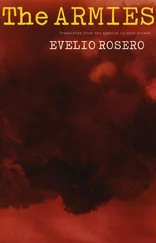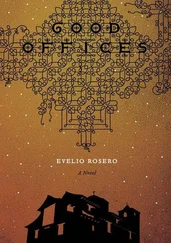Chivo returned to the stage.
The students were leaving in increasing numbers.
Without taking his eyes off the page, Professor Chivo said to them: “I can hear you rushing off, señores. Rush off and read Sañudo and check the inventory. I’m sure I forgot something.”
In spite of having so few listeners left, he took up reading again. His voice and face seemed steady; in fact he felt saddened, not just by his students but by himself, by his apparent inability to stimulate discussion and capture attention. A sudden drowsiness came over him: he would have liked to be at home, sleeping alongside his cat.
But he carried on.
The more he read, the more desertions there were on the part of the students.
From time to time, Chivo raised his eyes for a few seconds to observe the young faces still watching him, and perceived that several of them were afraid to show interest in what they were hearing, as if they were committing a sin — but what, or who, was causing this fear?
According to the students, then, it was not just Karl Marx, but also the Liberator Simón Bolívar who was being horribly maligned in the mad-man’s classes.
Chivo said it never occurred to the angriest students — the very ones who should have carried out the most careful analysis — to check the veracity of the article. They accepted only their own ideas. And he was not mistaken: the students concluded that the Marx text was spurious, that it must have been written by Chivo, the imperialist puppet, spy and retrograde, terms that were all the rage at the time, only a few years on from the Cuban Revolution. Young people across a number of faculties were considering abandoning their degrees and heading off into the mountains of Colombia, to the guerrilla war, which had not yet officially begun but was already a great hope that guaranteed the taking of power, as Cuba demonstrated, they said: in less than five years a new revolution will shake Latin America, a Colombian revolution.
And when, in the company of Karl Marx and José Rafael Sañudo, they came to the War of Independence in Pasto, the capital of Nariño province, southern Colombia, beginning with the Battle of Bomboná, things for Professor Arcaín Chivo took — as he himself would say — a turn for the worse. Because it was following those last, surreptitiously defiant classes (in which the Battle of Bomboná defined Bolívar’s ignominy, no more no less, and Pasto’s Black Christmas made Bolívar’s name synonymous with barbarism) that Arcaín Chivo had to leave the post in history, after a very discreet kick from the vice chancellor at first, and then a very real kicking from hooded heavies who frightened off, once and for all, an already frightened Arcaín Chivo. He lost his irreverence and mischievousness, his speculative daring, and accepted his thoroughly humiliating situation; he never imagined that the university’s board of governors and the academics of Pasto University themselves, most of them Pastusos, hailing from various Nariño villages, precisely where Bolívar had surpassed himself in vengeance and brutality, would actually disagree with historical truth and not support even a single one of his arguments — or the claims of Karl Marx, or those of José Rafael Sañudo — and, worse still, would be scandalized, would throw him out.
“Professor Chivo,” Enrique Quiroz had said to him — known as “Enriquito” to his friends, he was one of the famous Quiroz brothers, and was the president of the student committee — speaking right at the critical moment of one of Chivo’s classes, “bear in mind that Pasto, our city, was royalist, monarchist, opposed to the republic, to the call for independence from the American people. Pasto was a Spanish stronghold, nobody can deny it, and in that and that alone lies the cause of Bolívar’s justified aversion.”
“Let’s consider first that call for independence from the people of the Americas,” Chivo replied. “Then we’ll move on to Pasto being a royalist stronghold, and then to what you call Bolívar’s justified aversion.”
He was on his feet, leaning back against the desk, fingers spread around the wooden edges. It was the first teaching period of the morning: the room smelt of soap and cologne. Before him were thirty-two heads: the boys bearded, the girls with bare legs; Chivo did not look at the girls, not a bit, he would lose his grip, he had to finish his lecture (although he used to publicly admit in the canteen that he was one of those lecturers happily aroused by the blur of his fashion-conscious female students, who looked as if they were nude from the waist down; he said this quite openly). The bearded faces got him worked up in a different way, they made him laugh indulgently: they are just twenty-year-old faces, he used to say, but hairy ones, and he said it with a gesture that seemed scathing, but was in fact only quasi-paternal irony; he never imagined they would hate him for that too.
Through the large windows, the volcano Galeras darkened.
“No people,” he said, “achieved independence then, and it’s possible none has done so yet. The cry for independence was less than half a cry: it was a yelp from the Creole elite, the bourgeoisie who wanted to make the most of the carve-up at any price. None were thinking of their fellow Americans or other such moony dreams, but about their own property, ladies and gents. That’s why they were yelping.” Here the professor started to yap like some strange caged animal, and was delighted to observe the smiling admiration of the girls, his blurry female students, and gladdened by the indignation of the bearded ones.
“Not all the Creoles behaved as you say,” Enrique Quiroz interrupted.
“They did,” Chivo countered, “every last one of them. But their yelp got away from them; they only wanted the powers of the monarchy so they could rule as they pleased and enjoy more of the spoils, and what happened was that the wretched of the Americas, the valiant Indians and even more valiant campesinos , who really had suffered the perennial lash on their own backs ever since the conquest, got worked up over the yelp, cried out with manly might, the powder keg was lit and, just like Bolívar, the little rich kids set off to command a war without knowing a thing about military strategy, but the nigh-on suicidal fearlessness of the Indians and peasants supported them, and they gained independence from Spain and then didn’t know what to do. Perhaps it would have been better to wait fifty years, or a hundred? Nobody was prepared. And the oh-so-great example of their first leader was an atrocious one: from Bolívar stem dictatorships large and small, and all these shoddy, corrupt entities that the most cynical commentators have taken to calling ‘developing countries’; the Indians and peasants are in the same situation as ever, and into their proverbial poverty are now added workers in the cities. It’s as if the girl sitting at the furthest desk — yes, you — were to decide to swap one inadequate, temperamental boyfriend who sometimes exasperates her, swap him not for one, but two brutal boyfriends, two eternal rivals who never tire of stripping her naked, who slap her, torture her, bleed her, prostitute her, sell her in the marketplace, spit on her; Colombia had very bad luck with this whole climax of independence, señores. ”
Here Professor Chivo could not avoid the blushing young woman who smiled at him from behind her desk. He had to hurry the class along, because composure was no longer possible for him.
“Forgive me,” he said to the girl later, as he shut his book with a thump, signalling the end, “forgive me for using you in my feeble allegory.”
Her thin voice was heard over the racket of scraping desks:
Читать дальше












